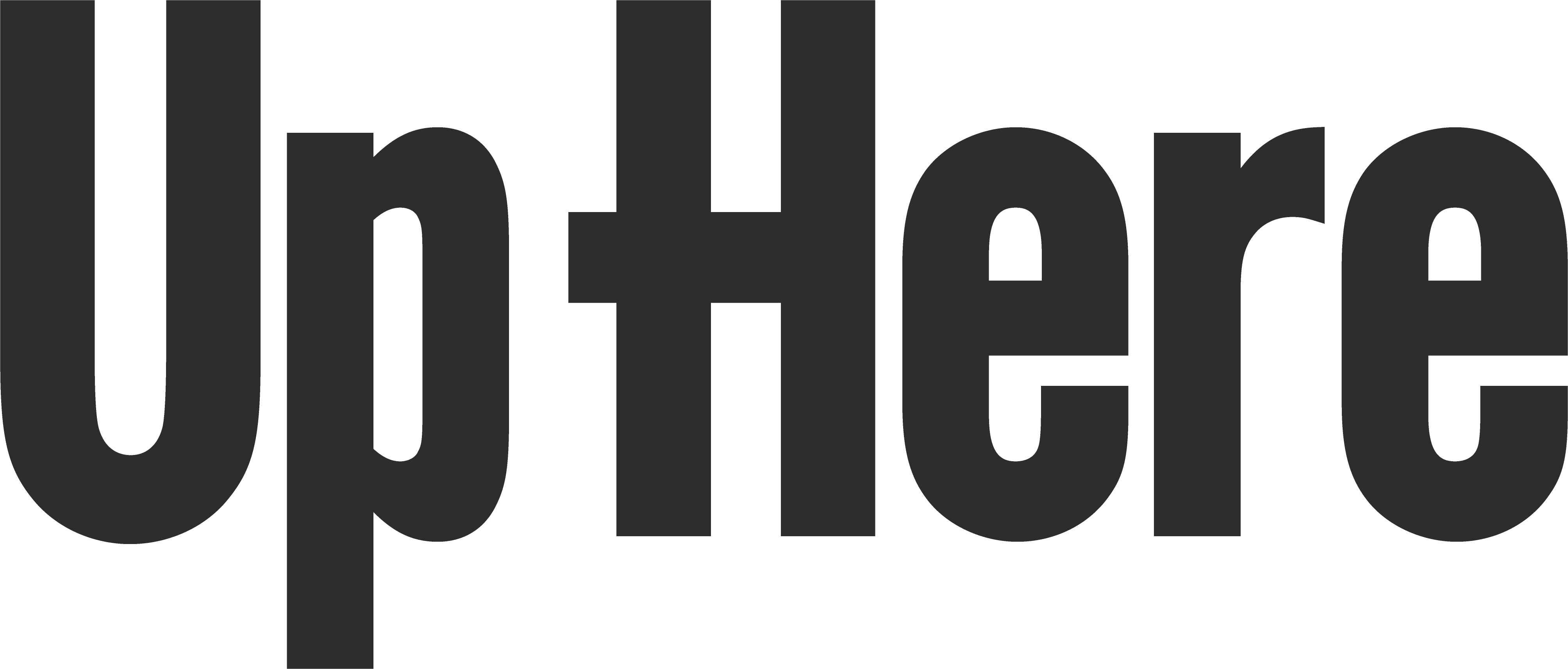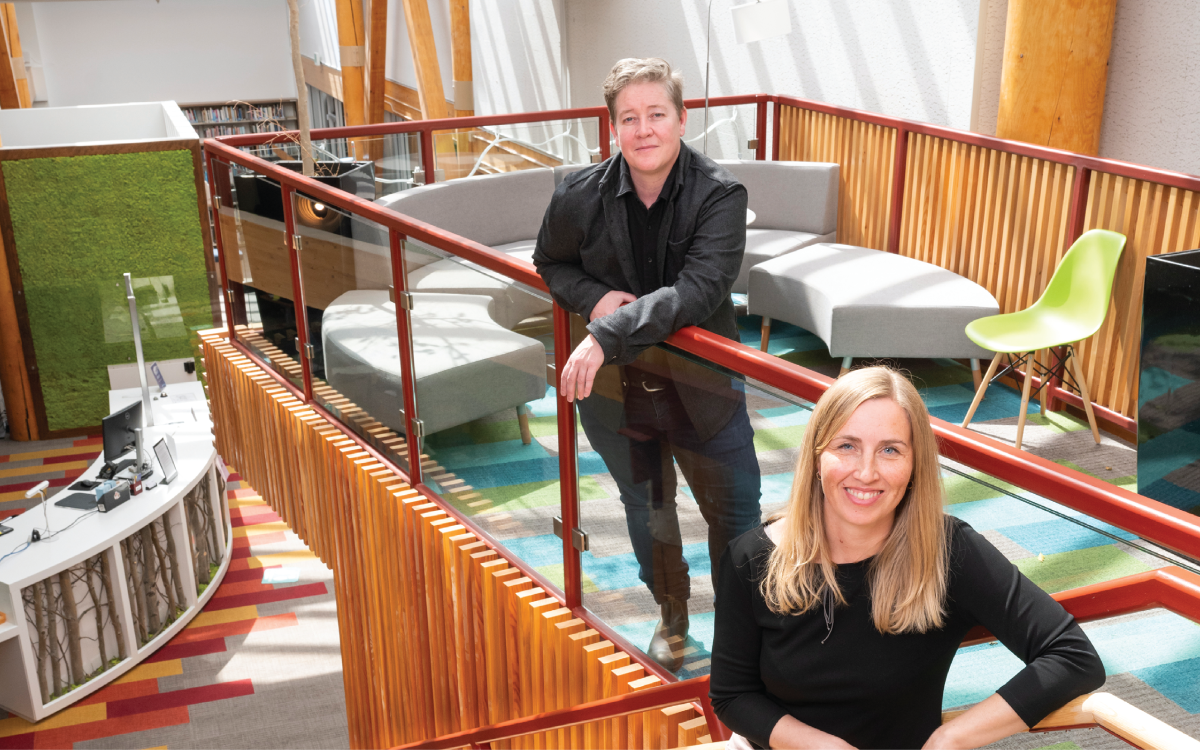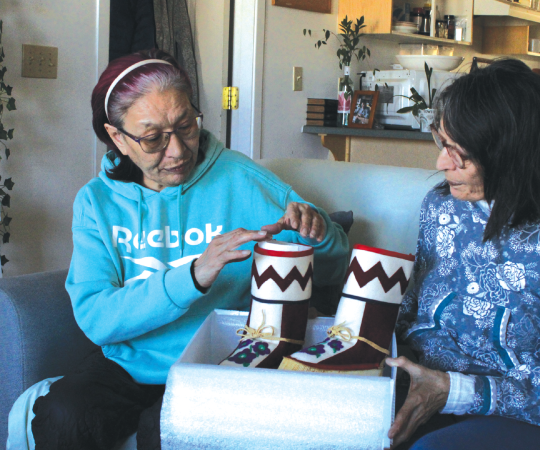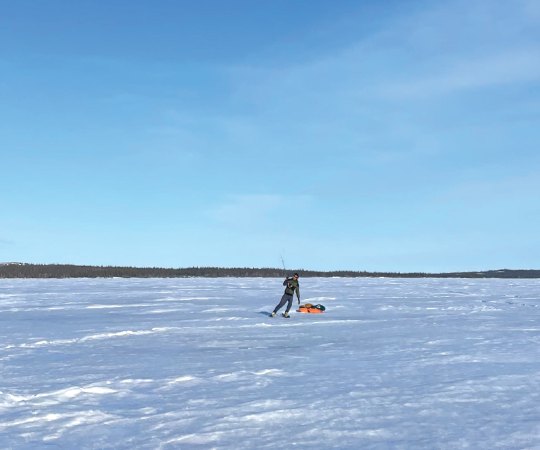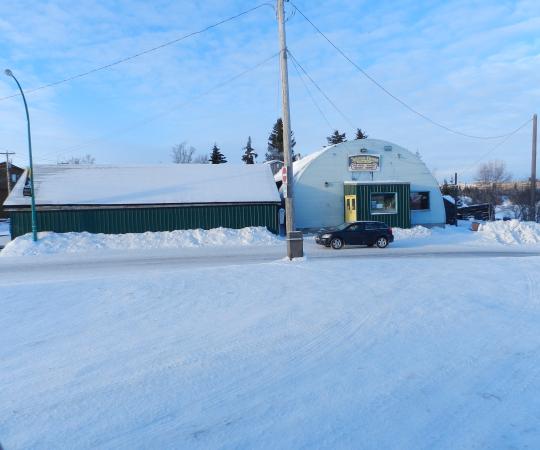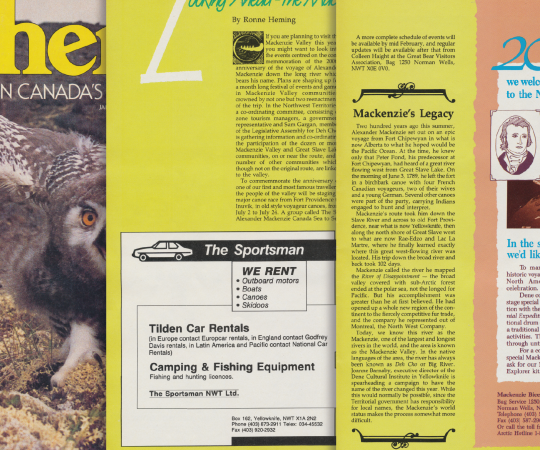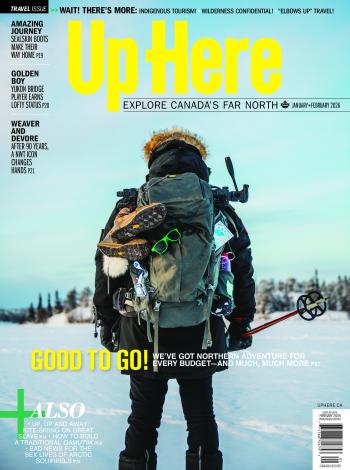It’s five past noon on a Friday in mid-March and room A2402 at Yukon University is packed with people, brows furrowed and stares focused. The only sound is the clacking of fingers on keyboards and the occasional loud sigh. It’s Free Write Friday and a community of about 30 Whitehorse writers—memoirists, fiction writers, writers of colour, trans writers, and poets—have gathered to work together. They haven’t come to read out loud or critique each other’s work, but just to sit in the same room and write.
Free Write Fridays are the creation of Ivan Coyote, a Whitehorse-born creator of 13 books, four films, seven stage shows, and three albums of music and storytelling. They are also a veteran of countless tours and presentations and the recipient of two honourary doctorates, including the first ever granted by YukonU. Now, after 30 years, they’ve returned to their hometown from Vancouver and London, Ont., for a new job: specialist in creative engagement and expression at YukonU, a position with a unique job description.
“I’ve been tasked with making the campus more accessible and safer and more welcoming to different voices via creativity. That’s how I see my job,” Coyote says. Free Write Fridays are a case in point. Participants don’t have to register, sign in, or pay, and snacks are provided. “I’ve tried to make it as easy as possible to be involved,” Coyote says.
Yukoners enjoy a rich vein of storytelling, starting with Indigenous peoples’ oral histories. Settlers from different writing traditions have added to that legacy over generations. Yet activity in the Yukon’s words community has ebbed and flowed. The hum of quiet industry in the background erupts into a flurry of public activity when conditions are right—a theatre festival, a writing contest, a reading series. Or a new university that seeks to foster inclusion through creative expression. The challenge is how to harness that creative energy, give a more consistent place and profile, and make sure everyone feels welcome.
To achieve that goal, members of the writing community are creating a range of opportunities where writers of all styles, genres, and cultures can share their work, ideas, inspiration, and voices in an inclusive and supportive environment. Coyote compares this emerging network to a “mycelium,” the generative, underground network of filaments that allows a mushroom to grow.
Another writer in the effort is poet Jamella Hagen, who has taught creative writing courses at Yukon University for the past 11 years, starting when the school was still Yukon College. In the fall of 2023, she led an in-person class for the first time since the onset of COVID-19. Enrollment was low, so Hagen reached out to the writing community. Her second-semester class sold out and had a waiting list. In both sessions, her students were a combination of published writers, university students, and word artists at all stages looking for commitment and community—the same mix as the weekly Free Write Fridays.
“I feel really fortunate that my classes recently have included people at all stages of their creative practice,” Hagen says. “What we’re
doing here is part of a larger movement to empower student writers and create a more inclusive literature.” A key feature of that movement is a workshop model that encourages students to direct the editorial process for their own work. Classmates tell the author what they found meaningful in their work; the author responds with questions they need answered. Are the characters convincing? Is there a good balance of description and dialogue? Finally, students ask permission to give the author opinions or suggestions.
Eleanor April, a student in Hagen’s class with experience in academic writing and some “dabbling” with personal essays, ended the term with a piece that brought the class to a standing ovation: an impassioned personal manifesto about being trans. “Everyone in that class really appreciated open pieces that say … this is who I am, this is how I’m engaging with the world, this is how I tell the story of my life,” April says.
As a result of her reading in Hagen’s class, April was invited to present her piece at the inaugural Words Out Loud open mic in March, an event organized by Yukon Words, a non-profit that supports Yukon writers and storytellers. To prepare, she signed up for an hour-long writing consultation that Coyote offers at YukonU. The sessions can be about anything: pitching ideas, getting feedback, or simply giving thoughts a sounding board. April used hers to get ready for the Yukon Words gig. “[Coyote] really helped me elevate the piece,” she says. “They gave me great advice about reading out loud, such as think of it as a high staircase with landings. You build in pauses. Because you need that for audiences to keep up. And, you do need to breathe.”
April’s reading resonated with the packed audience at Words Out Loud as much as it did with her fellow students. She continues presenting at open-mic events and has submitted work to a Canadian literary magazine. “Part of my goal is to be a somewhat openly trans person in this space, and kind of make sure that there is and continues to be room there.”
That’s Coyote’s goal, too. At a university talent show they hosted in February, five out of nine performers were trans or non-binary. “You just don’t see those numbers,” they say.
For Hagen, it’s vital students’ voices be heard beyond the classroom and students hear the voices of other Yukon writers. To that end, she has partnered with other resources at the university—the library, the School of Liberal Arts, and the Research Services Office—to present a Northern Stories evening each semester. The events feature diverse and established writers, followed by a craft-focused panel discussion. Hagen expected an audience of 30 at the first Northern Stories evening; 75 people showed up. At the second reading, the number climbed to 85.
Amanda Graham, chair at YukonU’s School of Liberal Arts, called the events a step up from having a visitor to a class. “[It’s] a good model for how we might do a pedagogical series, talks that are directed at students, but the public gets to listen in.”
Coyote brought that conversation to the stage at the Yukon Arts Centre through a partnership between YukonU and the arts centre for a series of literary talks. Their first guest was Métis writer Cherie Dimaline, whose novel, The Marrow Thieves, won the Governor General’s Literary Award for fiction, in 2017. Coyote’s and Dimaline’s conversation ranged from road-trip war stories to Dimaline’s tributes to her grandmother and aunties for keeping her safe as a kid. But the common thread was craft: how do you do what you do?
That’s a question with many answers. In Hagen’s second semester, for example, a student asked if he could tell his story orally, a first for the class. Joseph Ernest (Ernie) Lennie, a Dene elder from Tulit’a, NWT, is a survivor of residential school, an Olympian, and a front-line worker in community healing. But he’s been afraid to share his story, having learned the danger of speaking out in residential school.
Lennie started cross-country skiing in Father Jean-Marie Mouchet’s Territorial Experimental Ski Training program in the mid-1960s, a hatchery for many of Canada’s best cross-country skiers, most of them Indigenous. Lennie was Canadian Junior Champion in 1971 and on the Canadian World Championship Team in Falun, Sweden, in 1974 and the Canadian team in the Innsbruck Olympics in 1976. Determined to participate in the 1980 Olympics, he trained on his own until his money ran out. He sold his skis to make is way home to the NWT from North Bay where he’d been training.
“I thought I failed when I didn’t make it to [those] Olympics,” he says, tearing up. Finally, through the process of sharing his story, Lennie is easing the burden of that experience. He’s also sharing a technique with his classmates: how a storyteller writes drafts in real time and with an audience.
Ben Charland, another of Hagen’s students and a board member at Yukon Words, has new pathways in mind, too. He and executive director Jacqueline Bedard, a graduate of Hagen’s class, are developing a series of programs, such as the now-monthly Words Out Loud newsletter and Yukon Words first writing contest. Charland likens the society’s efforts to those of park rangers. “We want to encourage [the park], to protect it.... We want people to come in and take a look,” he says.
Yukon Words and Coyote are also looking to connect with communities beyond Whitehorse. Yukon Words travelled to Atlin in June, and Coyote has their eye on YukonU’s satellite campuses.
In other words—and to borrow Coyote’s metaphor—they are helping create a mycelium, a network of strands to support and generate new growth. “As a connection,” Coyote says, “it’s magic.”
